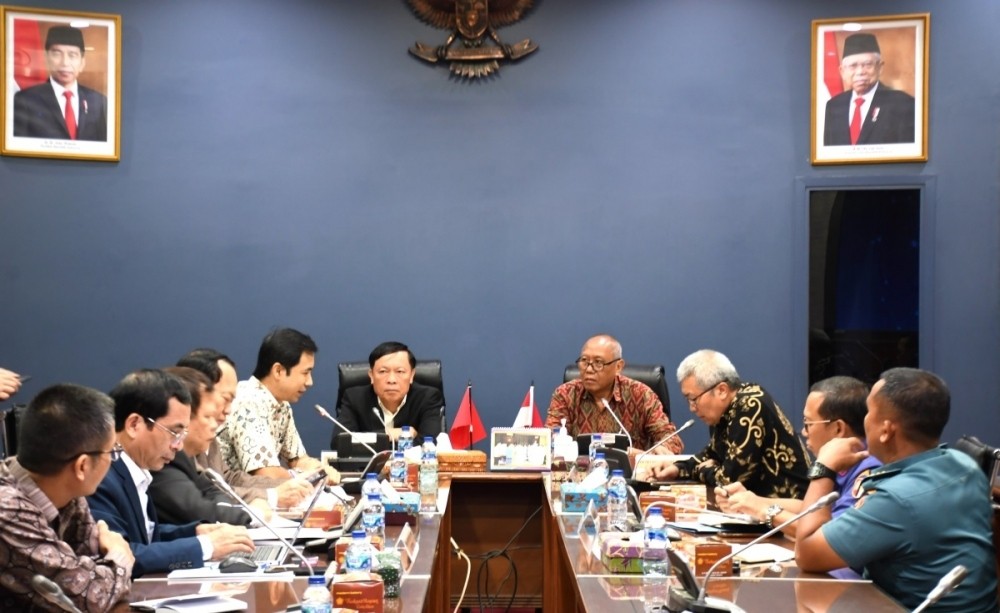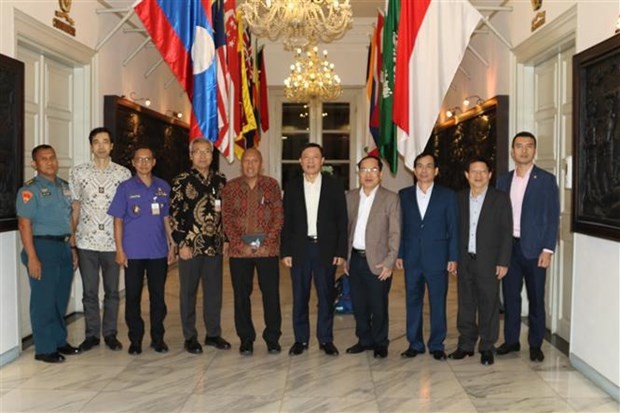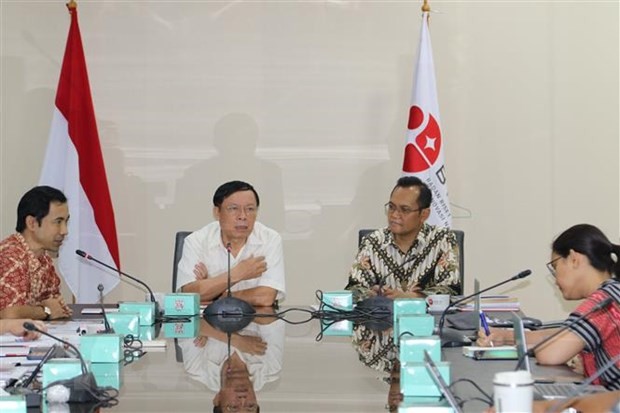According to a report from VOV, a delegation from the Central Theoretical Council, led by Vice Chairman Associate Professor Dr. Pham Van Linh, visited the Indonesian capital of Jakarta from October 4-8.
 |
| At the working session between the delegation of the Central Theoretical Council led by its vice chairman, Associate Professor. Dr. Pham Van Linh and representatives from Indonesia’s Lemhannas Institute. Photo: VOV |
During their working visit, our delegation had the opportunity to engage in meaningful discussions and share valuable experiences in resolving religious and ethnic issues. We exchanged ideas and insights with several prominent agencies and research institutes in Indonesia.
During the working session on October 5, a delegation met with Indonesia’s National Resilience Institute (Lemhannas Institute) and acknowledged the cultural similarities and shared history of both countries in the fight for national independence.
They also recalled the traditional friendly relations that exist between the two countries, ties which were originally and painstakingly nurtured by President Ho Chi Minh and President Sukarno.
Prof. Dr. Linh emphasized that Vietnam, after enduring a challenging struggle for national independence and protection, places great importance on peace and strives to maintain stability for its ongoing development.
 |
| The delegation from Vietnam’s Central Theory Council in a group photo with representatives of the Indonesian National Resilience Institute (Lemhanas). Photo: VNA |
During this process, there are issues that must be further researched, such as ethnic and religious issues,
he emphasized.
In a brief introduction of the nation’s ethnic groups and religious beliefs, Prof. Dr. Linh emphasized the Vietnamese Party and State’s commitment to respecting and implementing policies that guarantee freedom of religious belief. Moreover, they prioritize equality and solidarity among religions, while simultaneously safeguarding and promoting national cultural identity and strengthening national unity.
Prof. Ikrar Nusa Bhakti of the Lemhannas Institute expressed his satisfaction with the significant advancements achieved in bilateral relations.
He expressed his desire to not only share Indonesian practices but also learn more from Vietnam regarding managing and solving ethnic and religious issues, as well as exchanging experience in national construction and development.
 |
| Vice chairman, Associate Professor. Dr. Pham Van Linh meets with ISSH President Ahmad Najib Burhani. Photo: VNA |
During a working session at the Indonesian Institute of Social Sciences and Humanities (ISSH) on October 6, organized by the National Research and Innovation Agency (BRIN), Prof. Dr. Linh revealed Vietnam’s goals for development. By 2030, Vietnam aims to achieve the status of a developing country with a high middle-income, and by 2045, it aspires to be a developed country with a high income.
According to the source, there is a strong demand for extensive research in various fields to support national development.
Associate Professor, Ph.D. Pham Van Linh has recognized the numerous similarities and significant cooperation potential in scientific research between Vietnam and Indonesia. He has expressed his desire for the Indonesian side to provide insights into their operating mechanism, funding source, and topic selection and prioritization procedures, particularly in relation to urgent national issues.
The Vietnamese side is interested in learning from Indonesia’s expertise in addressing ethnic and religious matters, promoting equality, and preserving and celebrating the cultural diversity of different ethnic groups.
ISSH President Ahmad Najib Burhani expressed support for the proposal put forth by the Vietnamese side. He mentioned that there are various areas in which both parties can collaborate, including the growth of human values, economic development, and the assurance of national security, particularly maritime security.
According to Ahmad Najib Burhani, both parties can commence their collaboration by working on smaller projects or specific research issues before taking on larger research projects.
During the meeting, Linh expressed his optimism about future scientific research cooperation between the two sides. He emphasized the importance of more meetings and exchanges at various levels, both in Indonesia and Vietnam. This approach, he believes, will allow for gradual progress and enhanced collaboration in the field.
|
According to data from the Government Committee for Religious Affairs, Vietnam’s religious landscape has evolved significantly over the years. In 2003, the country had six religions comprising of 15 organizations, with a total of 17 million followers. Additionally, there were around 20,000 places of worship as well as 34,000 dignitaries and 78,000 sub-dignitaries. Fast forward to 2022, Vietnam now recognizes 43 organizations representing 16 different religions. The number of followers has increased to an estimated 27.2 million, and the country counts over 53,000 dignitaries and 148,000 sub-dignitaries. Moreover, there are now 29,718 places of worship established across the nation. Each year, more than 8,000 festivals connected to various beliefs and religions take place, drawing the participation of tens of thousands of devoted followers. |
Lan Ha bay among stunning global images by Belgian traveler
An image showcasing Lan Ha bay in Quang Ninh province features among a collection of stunning global images taken from above by Belgian photographer Johan Vandenhecke.








